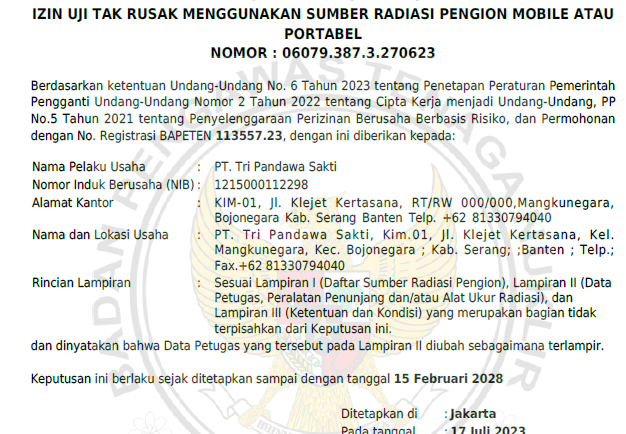Understanding BAPETEN Permission for Non-Destructive Testing Using Mobile Ionizing Radiation Sources
PORTOFOLIO
Admin
6/22/20242 min read


Introduction to BAPETEN and Its Role
The Nuclear Energy Regulatory Agency, commonly known as BAPETEN, is the regulatory body in Indonesia responsible for overseeing the safe use of nuclear energy. In industries where non-destructive testing (NDT) is critical, BAPETEN plays a pivotal role in ensuring that mobile or portable ionizing radiation sources are used safely and effectively.
The Importance of Non-Destructive Testing
Non-destructive testing (NDT) is a crucial process in various industries, including construction, manufacturing, and aerospace. It allows for the inspection and evaluation of materials, components, or assemblies without causing any damage. This ensures the integrity and longevity of the components, reducing the risk of failure and enhancing safety standards.
Mobile or portable ionizing radiation sources are frequently used in NDT to examine the internal structure of objects. These sources can identify flaws, cracks, or other defects that are not visible to the naked eye, providing invaluable information for quality control and maintenance.
Obtaining Permission from BAPETEN
To use mobile or portable ionizing radiation sources for non-destructive testing, obtaining permission from BAPETEN is mandatory. This process ensures that the use of such radiation sources complies with national safety standards and regulations.
The application for permission involves several steps:
1. **Submission of Required Documentation:** Applicants must provide detailed information about the radiation sources, including their specifications, intended use, and safety measures.
2. **Safety Assessment:** BAPETEN conducts a thorough safety assessment to evaluate the potential risks and ensure that adequate safety protocols are in place.
3. **Training and Certification:** Operators must be trained and certified to handle ionizing radiation sources safely. This includes understanding radiation protection principles and emergency procedures.
Ensuring Compliance and Safety
Once permission is granted, continuous compliance with BAPETEN regulations is necessary. This includes regular inspections, maintenance of the radiation sources, and adherence to safety protocols.
Using mobile or portable ionizing radiation sources responsibly is not only a regulatory requirement but also a moral obligation to protect workers and the environment from potential radiation hazards.
Conclusion
BAPETEN's role in regulating the use of mobile or portable ionizing radiation sources for non-destructive testing is crucial for maintaining safety standards in various industries. By obtaining the necessary permissions and adhering to stringent safety protocols, companies can ensure the effective and safe use of these powerful diagnostic tools.


Gallery
Portofolio
Article
NDT, Non-Destructive Test
Radiography
Ultrasonic Test
Magnetic Particle
Penetrant Test
Phase Array Ultrasonic Test
Eddy Current Test
Boiler tube Oxide scale Inspection
In-situ Replica metallography
Heat Treatment
Condition Monitoring
Others testing, Inspection and Analysis
DT, Destructive
© 2024. All rights reserved.
PT TRI PANDAWA SAKTI
Kim.01, jln. Klejet kertasana, RT/RW. 006/003,
kampung-kubang gede, kel. Mangkunegara,
Kec. Bojonegara, Kab. Serang- Banten. 42454
Branch Office Batam
Kawasan Buana Central Park
Komplek Jefferson no. 40, RT. 005 / RW.001
Kecamatan Batu Aji, Kelurahan Kibing
Batam 29422 - Kep. Riau
PWHT
Preheat
Hardness Test
RCFA-Root Cause Failure Analysis
FFS - Remaining life Assessment
CUI- Corrosion Under Insulation
Vibration Monitoring
Rope access inspection
Drone Inspection
Hydro Test
Vacuum Test
Welding Inspection
Equipment, Instrument Calibration & Certification
PMI - Positive Material Identification
Tank Inspection, Assessment and RLA
Corrosion Under Insulation
Pipe Stress analysis
Geotextile Test
Tensile Test
Bending Test
Head Office
